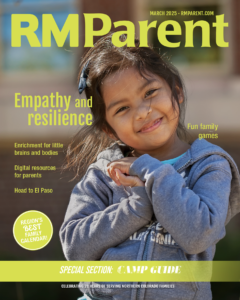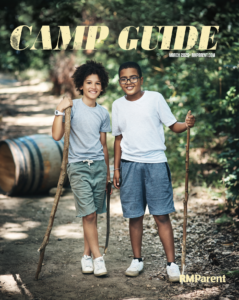Empowering kids with trust and respect
As much as we wish we could ensure our kids only experience joy and success, life happens. A fumble loses the game, a paper earns a poor grade, a friend hurts feelings. The best we can do is prep our kids to respond with grace and confidence, learn from what happens, and stand strong rather than crumble the next time they face a challenge. Often, the best way to build inner strength and confidence is to get out of our kids’ way and let them take the lead. Let them try, let them fall, let them speak, and let them be.
Let them try
It’s tempting to take over for our kids, whether it’s jumping in to tie a kindergartener’s shoe because you are running late for school, or helping to create the poster for a science fair project. We want our kids to succeed. Yet when we do for them rather than letting them do for themselves, they don’t integrate what it takes to accomplish tasks or advocate for themselves. This can result in a lack of confidence or kids getting easily overwhelmed by roadblocks.
“When parents jump in to save their kids from failure, it usually comes from a place of ego or fear. In the end it creates codependency. Kids who are allowed to try learn to deal with stress and they develop a sturdy backbone that sustains them through future challenges,” says Dannie Mironski, MA, LPC, N.C.C., co-owner of Parent-Child Interaction Center, which offers a full range of counseling services for teens, adults, and couples in areas such as stress management, depression, conflict management, anger management, anxiety, and sexuality to families in Fort Collins and Boulder.
A simple way to let kids try is empowering them to make choices for themselves. When they are small, let them pick out their clothes, choose between healthy items for their school lunch, take relatively safe risks with their body, like climbing low boulders or jumping from rock to rock. As they grow, expand the choices by asking them for input when it comes to family outings or household chores, and honor their answers.
“Allowing children to make decisions promotes autonomy and free will,” Mironski adds.
If kids are scared to try something, like confronting a friend or talking with a teacher, role play with them. You be the teacher or friend and let your child talk, without interruption. The key is sending the message that you back them up.
“Start by validating their emotions, as in, ‘I hear you. That sounds hard. You feel like you were treated unfairly.’ Then ask what they want to do about it and if needed, give gentle guidance,” Mironski suggests.
As a general rule of thumb, by second or third grade you can start suggesting that your children tell their teacher, coach or childcare provider themselves when they have a need or concern. Until then, it’s fine to be their advocate. By fifth grade, they should be handling most conflicts by themselves to prepare them for middle school. If they have learning challenges, you may need to play a more prominent role while still letting them take the lead.
Let them fall
Kids mess up. We all do, so do whatever you can to normalize that truth. Send messages that it’s okay to not know the answer, to get confused, and to make mistakes. Show them that you mess up, too. Acknowledge your mistakes by casually saying in front of them, ‘Oh, I made a mistake. Now I know for next time.’ When kids learn that it’s okay to get it wrong, they will be more willing to roll with mistakes or mishaps instead of seeing them as the end of the world.
A great way to boost your child’s confidence is simply offering words of support. Take every opportunity to send messages through words and actions that say ‘I believe in you. I am lucky to have you in my life. You are worthy.’
“Sometimes, kids just need to hear your respect for them, as in, ‘I trust that you can handle this.’ When you believe in them, it helps them feel secure in themselves. If you fix every problem for them, you may see insecurity, neurosis, or on the other spectrum, entitlement,” Mironski adds.
Most importantly, allow for ‘do-overs.’ Encourage your child to own their mistake, say sorry when needed, and then literally wash your hands of it, saying, ‘Well, you are done with that,’ helping them let go and move on. No one is perfect, and that’s okay. What’s perfect is accepting the imperfection and moving ahead despite it.
Let them speak
Take every opportunity to talk to your kids about what’s happening in their lives. Ask open-ended questions, bite your tongue when you want to interject advice, and explore options with them in an open, respectful way. Studies show that when there is good communication between kids and their parents they don’t engage in as many risky behaviors when they are teens.
Be a good listener. Reflect back what you hear. Remember, there is no ‘one talk’—talk continually. State your values. Laugh together. Keep perspective.
When kids are rewarded for speaking up, they feel important. They start to believe that what they have to say is valuable. When they feel like they are heard they have better self-esteem. This leads to more communication, more healthy risk taking, and more leadership practice—all of which are valuable life skills.
Let them be
It’s easy to fall into the thinking that we know what’s best for our kids—what sports they should play, what grades they should get, what values they should hold, and how they should live their lives. Yet truly, our job is simply to tend the soil so our kids can grow and thrive into whatever beautiful or funky plants they are destined to become.
“As humans, we each go through so much that shapes us. A big barrier to becoming who we are is fear and anxiety. As parents, we have the opportunity to give unconditional love, which breaks down fear and builds confidence,” Mironski says.
To love unconditionally is simply to accept your child for who they are and love them for simply being themselves. There are no conditions placed on the love, like accomplishments they must achieve to earn your love. It’s there like solid ground, even when they screw up. You may not always like what your kids do or the choices they make, which is fine to say especially if safety is involved, but remind them that their choices or actions don’t change how you feel about them. Relish in who they are, cherishing every last quirky, goofy, different, and amazing way they inhabit the world.

Lynn U Nichols is a longtime Fort Collins-based freelance writer who specializes in health and wellness content. She raised two boys while writing for RM Parent Magazine, gratefully applying the wisdom she gleaned from interviews with child experts along the way. Learn more at healthwritecommunications.com.




